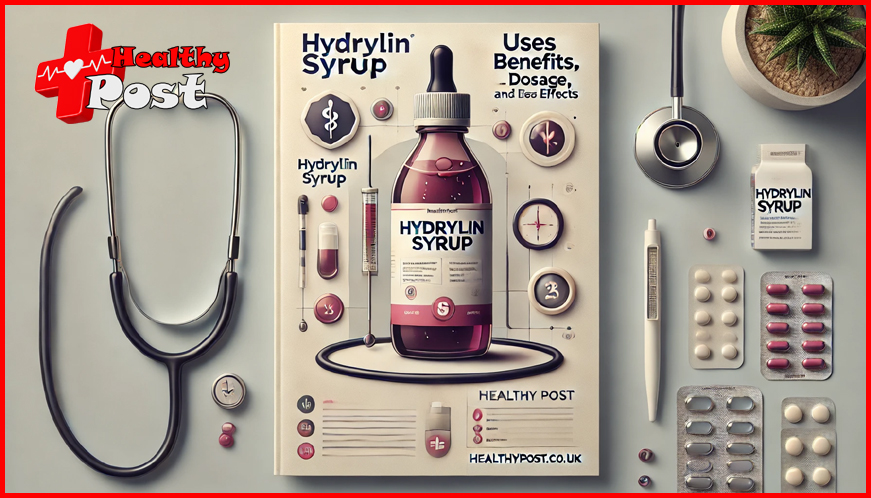
Hydryllin Syrup: Uses, Benefits, Dosage, and Side Effects
When dealing with persistent cough, congestion, or respiratory distress, finding the right medication can be challenging. Hydryllin Syrup is a widely used expectorant and bronchodilator that helps relieve respiratory issues by loosening mucus and easing breathing difficulties. In this comprehensive guide, we will explore everything you need to know about Hydryllin Syrup, including its benefits, dosage, side effects, and more.
What is Hydryllin Syrup?
It is a combination medicine used to treat cough and bronchial congestion. It contains active ingredients that help relax airway muscles and clear mucus, making breathing easier. This is commonly prescribed for conditions like asthma, chronic bronchitis, emphysema, and other respiratory ailments.
Active Ingredients
Hydryllin Syrup typically contains:
- Aminophylline – A bronchodilator that relaxes the muscles in the lungs, making breathing easier.
- Diphenhydramine – An antihistamine that reduces allergic reactions and helps control cough.
- Ammonium Chloride – An expectorant that helps in breaking down mucus.
- Menthol – Provides a soothing effect and helps clear nasal passages.
Uses and Benefits of Hydryllin Syrup
Hydryllin Syrup is commonly used to manage respiratory conditions that involve excessive mucus production and difficulty breathing. Below are its primary uses:
1. Relief from Cough and Congestion
The expectorant properties of Hydryllin help loosen mucus, making it easier to expel and relieving congestion.
2. Treatment of Asthma Symptoms
Aminophylline in Hydryllin acts as a bronchodilator, which widens the airways, making breathing easier for asthma patients.
3. Managing Chronic Bronchitis
It helps clear mucus build-up in the lungs, reducing inflammation and irritation in chronic bronchitis patients.
4. Soothing Effects for Respiratory Discomfort
The presence of menthol provides a soothing sensation to the throat and nasal passages, making it a preferred choice for flu and colds.

Hydryllin Syrup Dosage and Administration
Recommended Dosage
The dosage of Hydryllin Syrup varies based on age, medical condition, and doctor’s prescription. Below is a general dosage guideline:
| Age Group | Dosage (per dose) | Frequency |
|---|---|---|
| Children (2-6 years) | 2.5 ml | 3 times/day |
| Children (7-12 years) | 5 ml | 3 times/day |
| Adults | 10 ml | 3 times/day |
Administration Tips
- Take the syrup after meals to prevent stomach upset.
- Use a measuring spoon for accurate dosing.
- Do not exceed the prescribed dosage to avoid side effects.
Possible Side Effects of Hydryllin Syrup
While Hydryllin Syrup is generally well tolerated, some individuals may experience mild to moderate side effects, including:
- Drowsiness
- Dizziness
- Nausea or vomiting
- Headache
- Increased heart rate
- Allergic reactions (rash, swelling, difficulty breathing)
When to Seek Medical Attention
If you experience severe reactions such as difficulty breathing, irregular heartbeat, or severe dizziness, seek immediate medical attention.
Precautions and Warnings
Who Should Avoid Hydryllin Syrup?
- Individuals allergic to any of its components.
- Patients with heart conditions should use it cautiously.
- People with severe liver or kidney diseases should consult a doctor before use.
- Pregnant and breastfeeding women should take it only if prescribed by a doctor.
Drug Interactions
Hydryllin may interact with the following medications:
- Antihypertensives (may cause blood pressure fluctuations)
- Sedatives or alcohol (increases drowsiness)
- Other bronchodilators (may intensify effects, leading to rapid heartbeat)
Always inform your doctor about all medications and supplements you are taking.
Comparison: Hydryllin Syrup vs. Other Cough Syrups
| Feature | Hydryllin Syrup | Other Expectorants |
| Bronchodilation | Yes | No |
| Antihistamine | Yes | Varies |
| Expectorant | Yes | Yes |
| Menthol Soothing Effect | Yes | No |
| Suitable for Asthma Patients | Yes | Limited |
Hydryllin is a multi-functional syrup, making it more effective for complex respiratory conditions than regular expectorants.
Tips for Faster Recovery
To speed up recovery while using Hydryllin Syrup, follow these additional tips:
✅ Stay Hydrated – Drink plenty of fluids to thin mucus. ✅ Use a Humidifier – Moist air helps ease breathing. ✅ Avoid Smoke & Pollutants – Reduces irritation in airways. ✅ Follow Proper Rest & Diet – Boosts immunity and speeds recovery.
Frequently Asked Questions (FAQs)
1. Can I take Hydryllin Syrup for dry cough?
No, Hydryllin is primarily used for wet cough with mucus. For dry cough, consult your doctor for a more suitable option.
2. Is Hydryllin Syrup safe for children?
Yes, but only under a doctor’s supervision. Dosage should be carefully followed as per age guidelines.
3. Can I take Hydryllin Syrup with other medications?
It depends on the medication. Always inform your doctor about any other drugs you are taking to avoid interactions.
4. How long does it take for Hydryllin Syrup to work?
Most patients feel relief within 30-60 minutes after taking the syrup.
5. Can pregnant women use Hydryllin Syrup?
Pregnant women should only use it if prescribed by a doctor, as some ingredients may affect pregnancy.
Conclusion
Hydryllin Syrup is a powerful medication for managing cough, congestion, and respiratory ailments. With its bronchodilator, expectorant, and antihistamine properties, it offers comprehensive relief for asthma, bronchitis, and related conditions. However, always use it as prescribed and follow precautions to avoid side effects.
If you found this guide helpful, share your thoughts or ask questions in the comments below! Don’t forget to share this with others who might benefit from the information.
Disclaimer: This article is for informational purposes only and does not substitute professional medical advice. Always consult a healthcare provider before using any medication.

2 thoughts on “Hydryllin Syrup: Uses, Benefits, Dosage, and Side Effects”